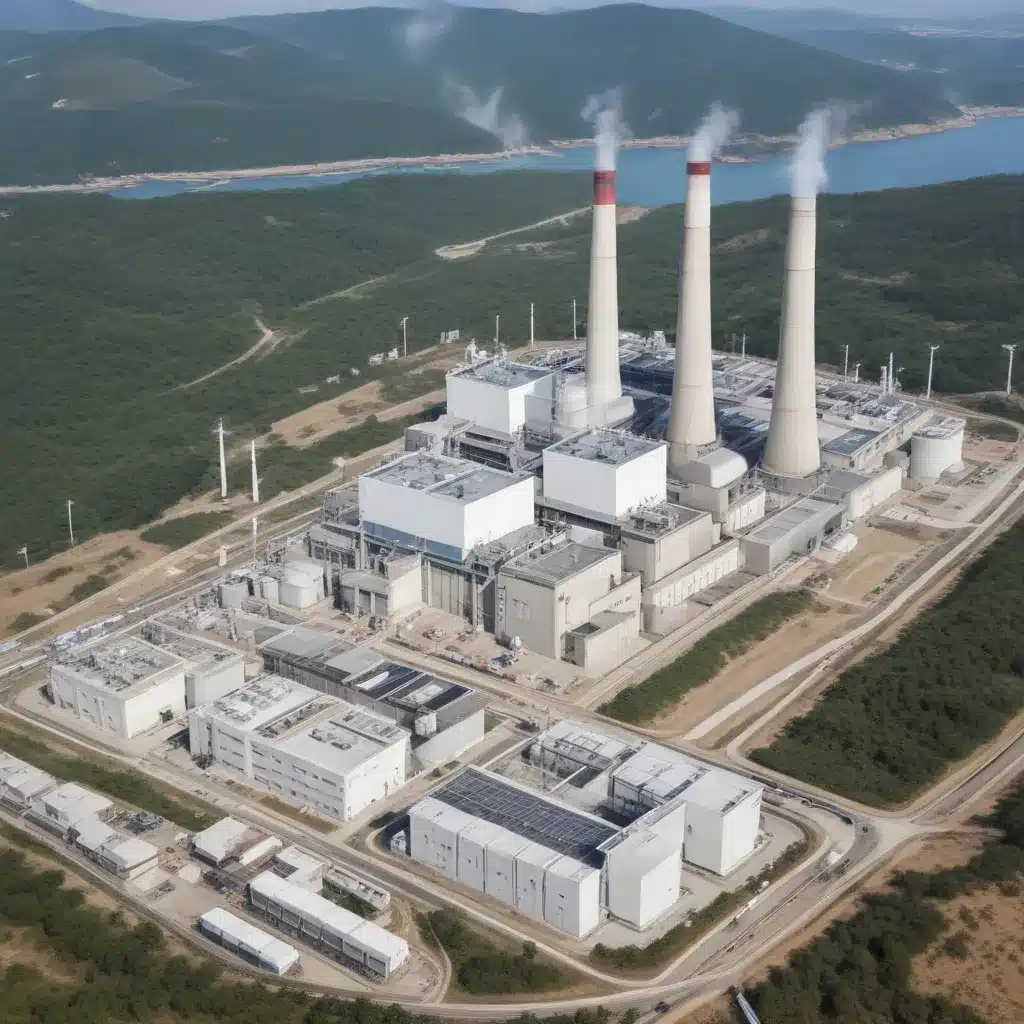
Harnessing the Power of Cogeneration for Industrial Efficiency
The Ulsan Hanju power station, located in the industrial heart of South Korea, stands as a testament to the country’s commitment to sustainable energy solutions. As a seasoned expert in wood stoves and heating systems, I’ve had the opportunity to delve into the intricacies of this power station and the broader implications it holds for the future of energy in the region.
Situated in the bustling city of Ulsan, the Hanju power station is a crucial component of the Ulsan Petrochemical Complex, serving as a centralized provider of heat and electricity to the industrial hub. Established in 1972 as the Petrochemical Support Corporation, the facility has undergone several expansions over the years, including coal-fired power projects in the 1990s and a transition to cleaner “BC oil” in the late 1990s.
One of the defining features of the Hanju power station is its utilization of combined heat and power (CHP) technology. This highly efficient system not only generates electricity but also harnesses the thermal energy produced, ensuring a more holistic and sustainable approach to energy generation. By optimizing the use of this waste heat, the Hanju power station is able to achieve remarkable energy efficiency, reducing overall resource consumption and emissions.
Navigating the Transition to Cleaner Fuels
As the global push for decarbonization gains momentum, the Hanju power station has found itself at the forefront of South Korea’s efforts to transition towards more eco-friendly energy sources. In 2021, the facility obtained permission from the Ministry of Trade, Industry and Energy to expand its CHP capabilities by adding 144 MW of capacity, including gas turbines and steam turbines.
This strategic move towards natural gas-powered cogeneration represents a significant step forward in the Hanju power station’s journey towards sustainability. The decision to shift away from coal, which is known for its high emissions and environmental impact, is a clear acknowledgment of the need to embrace cleaner energy alternatives.
However, the transition is not without its challenges. As the article notes, the Hanju power station’s management has cited the “burden of switching to eco-friendly fuels rather than coal” as a key driver behind the decision to invest in LNG-based cogeneration. This underscores the delicate balance that must be struck between economic considerations and environmental imperatives in the energy sector.
Leveraging Cogeneration for Industrial Efficiency
One of the standout features of the Hanju power station is its role as an industrial cogeneration facility, providing both heat and electricity to the Ulsan Petrochemical Complex. This integrated approach to energy management offers a range of benefits, including:
-
Improved Energy Efficiency: By capturing and utilizing the waste heat generated during electricity production, the Hanju power station is able to achieve significantly higher overall energy efficiency compared to traditional power plants that simply dissipate this thermal energy.
-
Reduced Emissions: The cogeneration process results in lower greenhouse gas emissions per unit of energy produced, as the same fuel input is used to generate both electricity and thermal energy, reducing the need for separate heating systems.
-
Cost Savings: The streamlined energy generation and distribution model employed by the Hanju power station allows for substantial cost savings for the industrial complex it serves, enhancing the overall competitiveness of the region’s manufacturing and petrochemical industries.
-
Reliability and Resilience: As a centralized energy provider, the Hanju power station offers a reliable and resilient supply of heat and electricity to the Ulsan Petrochemical Complex, ensuring the continuity of operations and reducing the risk of disruptions.
These advantages underscore the importance of cogeneration in driving sustainable industrial development and energy security, a model that could potentially be replicated in other industrial hubs around the world.
Embracing the Future of Energy
The ongoing expansion and modernization efforts at the Hanju power station reflect South Korea’s broader commitment to transitioning towards a more sustainable energy future. By investing in cleaner natural gas-based cogeneration, the facility is positioning itself to meet the evolving energy demands of the Ulsan Petrochemical Complex while aligning with the country’s environmental goals.
As the power station embarks on this journey, it will be crucial to closely monitor the project’s progress and evaluate its impact on the region’s energy landscape. Factors such as the station’s emissions profile, energy efficiency metrics, and the overall carbon footprint of the Ulsan Petrochemical Complex will be essential in assessing the success of this transition.
Moreover, the Hanju power station’s experience in navigating the challenges of fuel switching and the integration of renewable energy sources can offer valuable insights for other industrial hubs seeking to enhance their sustainability credentials. By sharing best practices and lessons learned, the Hanju power station can contribute to the broader conversation on sustainable energy solutions, ultimately benefiting communities and the environment alike.
Conclusion: Towards a Greener Future
The Ulsan Hanju power station stands as a testament to South Korea’s commitment to sustainable energy solutions. Through its innovative use of cogeneration technology and its ongoing transition towards cleaner natural gas, the facility is playing a pivotal role in the country’s efforts to reduce emissions and enhance industrial efficiency.
As the global shift towards decarbonization gains momentum, the Hanju power station’s journey serves as a valuable case study, showcasing the potential of integrated energy systems and the importance of embracing technological advancements to address the pressing environmental challenges of our time.
By continuing to explore and implement sustainable energy solutions, the Hanju power station and similar facilities can pave the way for a greener, more resilient future, not only for South Korea but for the global community as a whole. As a seasoned expert in the field of wood stoves and heating solutions, I am excited to see the innovative strides being made in the energy sector and the positive impact they can have on our collective quest for a sustainable tomorrow.


